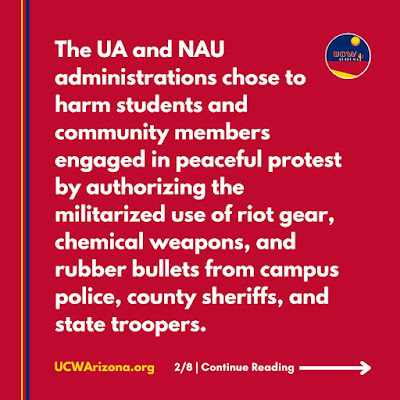On April 26, the Board of Directors of the Labor and Working-Class History Association (LAWCHA) unanimously issued a statement condemning the use of police to quash peaceful campus protests. Since issuing that statement, we have been horrified to learn that a number of LAWCHA members have been arrested while engaged in peaceful protests and that at least one of those -- Annelise Orleck of Dartmouth -- was thrown to the ground and arrested on May 1 and has now been banned from the campus where she has taught for 34 years. In light of these disturbing developments and on behalf of LAWCHA, the Executive Committee has added the language in bold below to our original statement:
The elected board and officers of the Labor and Working-Class History Association (LAWCHA), the majority of whose members work and study on college and university campuses, is alarmed by the recent deployment of uniformed officers to forcefully break up peaceful demonstrations on multiple campuses around the country. We strongly condemn the deployment of law enforcement officers to shut down and disperse nonviolent protests and we urge campus officials to respect the free speech rights of students, faculty, and staff. Furthermore, we demand that colleges and universities immediately rescind bans of faculty, students, or staff from their campuses as a result of their exercising rights to free speech and assembly.
This statement was unanimously approved by the LAWCHA Board of Directors
Joseph A. McCartin, Georgetown University, President
Eileen Boris, University of California at Santa Barbara, Vice President
Cindy Hahamovitch, University of Georgia, Immediate Past President
Erik Gellman, University of North Carolina, Secretary
Liesl Orenic, Dominican University, Treasurer
Janine Giordano Drake, Indiana University, Bloomington, Board Member
Danielle Phillips-Cunningham, Rutgers University, Board Member
Kim Phillips-Fein, Columbia University, Board Member
Aldo A. Lauria Santiago, Rutgers University, Board Member
Colleen Woods, University of Maryland, Board Member
Natanya Duncan, Director of Africana Studies and Associate Professor of History,
Queens College, CUNY, Board Member
David “Mac” Marquis, Postdoctoral Fellow, University of South Carolina, Board Member
Verónica Martinez-Matsuda, University of California, San Diego, Board Member
Samir Sonti, CUNY School of Labor and Urban Studies, Board Member
Jane Berger, Moravian University, Board Member
Keona K. Ervin, Bowdoin, Board Member
Aimee Loiselle, Central Connecticut State University, Board Member
Gordon Mantler, George Washington University, Board Member
Joel Suarez, Harvard University, Board Member
Liat Spiro, College of the Holy Cross
Faith Bennett, UC Davis
Rebecca Jean Emigh, UCLA, Sociology
Emily E. LB. Twarog, University of Illinois
Omari Averette-Phillips, UC Davis
Paul Ortiz, University of Florida
Harry Targ, Purdue University. Retired
Joan Flores-Villalobos, University of Southern California
Nate Holdren, Drake University
Bill Barry
Alan Wierdak, University of Maryland
Tamar Carroll, Rochester Institute of Technology
Cathy Brigden, University of Tasmania
Dennis Deslippe, Franklin & Marshall College
Tom Alter, Texas State University
Laura Murphy, Dutchess Community College
Erik Loomis, University of Rhode Island
James Young, Pennsylvania Labor History Society/National Writers Union
David Brundage, University of California, Santa Cruz
Aaron Jesch, Washington State University Vancouver
Anne Lewis, UT Austin, TSEU-CWA 6186
Lois Helmbold, San Jose State U, emerita professor
Lorenzo Costaguta, University of Bristol
David Brody
Rosemary Feurer, Northern Illinois University
Greg Kealey, University of New Brunswick
Michael Pierce, University of Arkansas—UAEA/Local 965
Naomi R. Williams, Rutgers University
Anita Rupprecht, University of Brighton, UK
Lisa Phillips, Indiana State University
Thai Jones, Columbia University
Heather Ann Thompson, University of Michigan
Miriam Cohen, Vassar College
Jon Bekken, Albright College
Peter Rachleff, Macalester College (Emeritus)
Eladio Bobadilla, University of Pittsburgh
Brian Greenberg, Monmouth University
Peter Cole, Western Illinois University
Lane Windham, Georgetown University
Cristina Groeger, Lake Forest College
Michael Kazin, Georgetown University
Andrea Taylor
Ruth Needleman, Indiana University
Aaron Jaffe, The Juilliard School
Beth Robinson , Texas A&M University - Corpus Christi
Shannan Clark, Montclair State University
John Enyeart, Bucknell University
Eric Fure-Slocum, St. Olaf College (emeritus)
Rick Halpern, University of Toronto
Robert Bruno, University of Illinois
Michael Lansing, Augsburg University
Jeff Schuhrke, Harry Van Arsdale Jr. School of Labor Studies, SUNY Empire State University
Priyanka Srivastava, Department of History, University of Massachusetts Amherst
Greta de Jong, University of Nevada, Reno
David Vaught, Texas A&M University
Sean Ahern, UFT
Michael Damien Aguirre, University of Nevada, Reno
Ian Rocksborough-Smith, University of the Fraser Valley
William Jones, University of Minnesota (past LAWCHA president)
Jacob Dorman, The University of Nevada, Reno
Michael Honey, University of Washington (past LAWCHA president)
Julie Greene, University of Maryland (past LAWCHA president)
Miriam Frank, retired professor of Humanities at New York University
Dan Graff, University of Notre Dame
James Bearden, SUNY Geneseo
Barbara Walker, UNR
Donna Haverty-Stacke, Hunter College, CUNY
Maggie Gray, Adelphi University
Deborah Cohen, University of Missouri-St. Louis
Robert Woodrum, Perimeter College of Georgia State University
Christopher Martin, University of Northern Iowa, United Faculty AFT/AAUP
Nelson Lichtenstein, University of California, Santa Barbara
Joe Berry, retired U of IL and City College of SF
Elizabeth McKIllen, University of Maine
Mary Reynolds, Reflective Democracy Campaign
Arman Azimi, College of the Holy Cross
David Zonderman, NC State University
William Keach, Brown University
Alex Miller, University of Washington Tacoma
Jeannette Estruth, Bard College and the Harvard Berkman-Klein Center
Kirsten Schultz, Seton Hall University
Edwin Rubel, University of Washington
Benjamin Goldfrank, Seton Hall University
Grace Reinke, University of New Orleans and United Campus Workers of Louisiana
Lynn Thomas, University of Washington
Raya Fidel, University of Washington
Dexter Arnold
Jana Lipman, Tulane University
Jacquelyn Hall , Emeritus UNC Chapel Hill (past LAWCHA president)
Leslie Bunnage, Seton Hall University
Margot Canaday, Princeton University
Rudi Batzell, Lake Forest College
Renata Keller, University of Nevada
Jennifer Brooks, Auburn University
James Kollros, retired
Emily Hobson, University of Nevada Reno
Kimberly Enderle, University of Massachusetts Amherst
Alyssa Ribeiro, Allegheny College
Jennifer Guglielmo, Smith College
Thomas Guglielmo, George Washington University
Shelton Stromquist, University of Iowa (past LAWCHA president)
Lizabeth Cohen, Harvard University
Jillian Jacklin, University of Wisconsin-Green Bay












